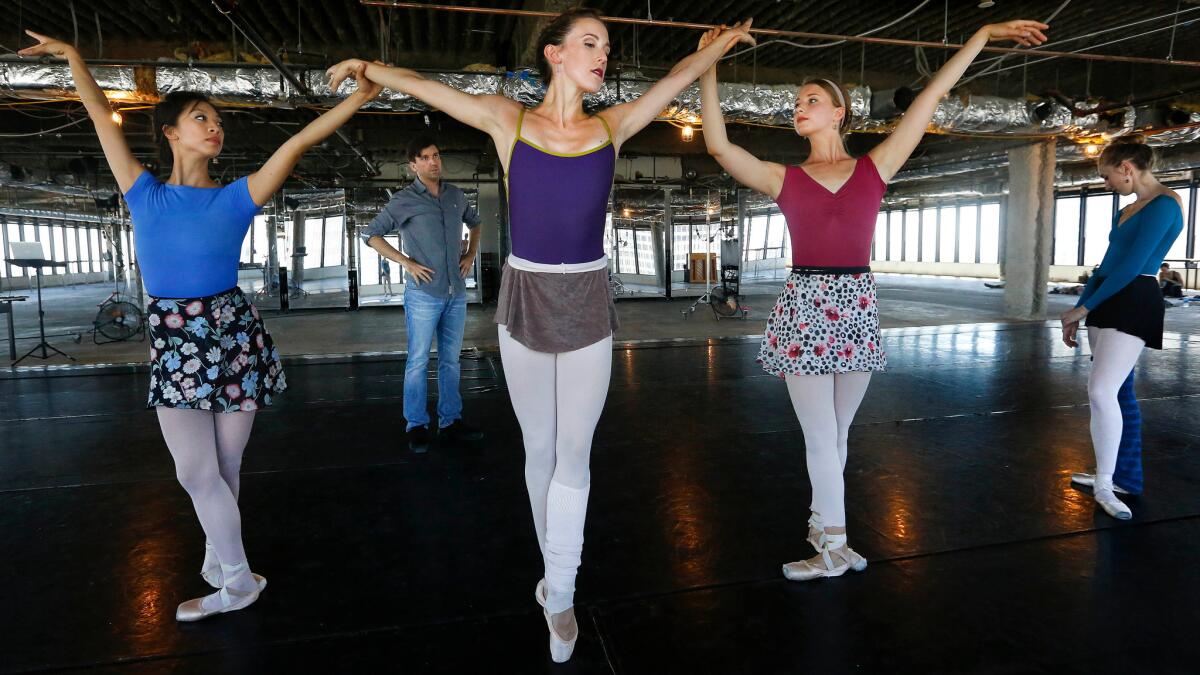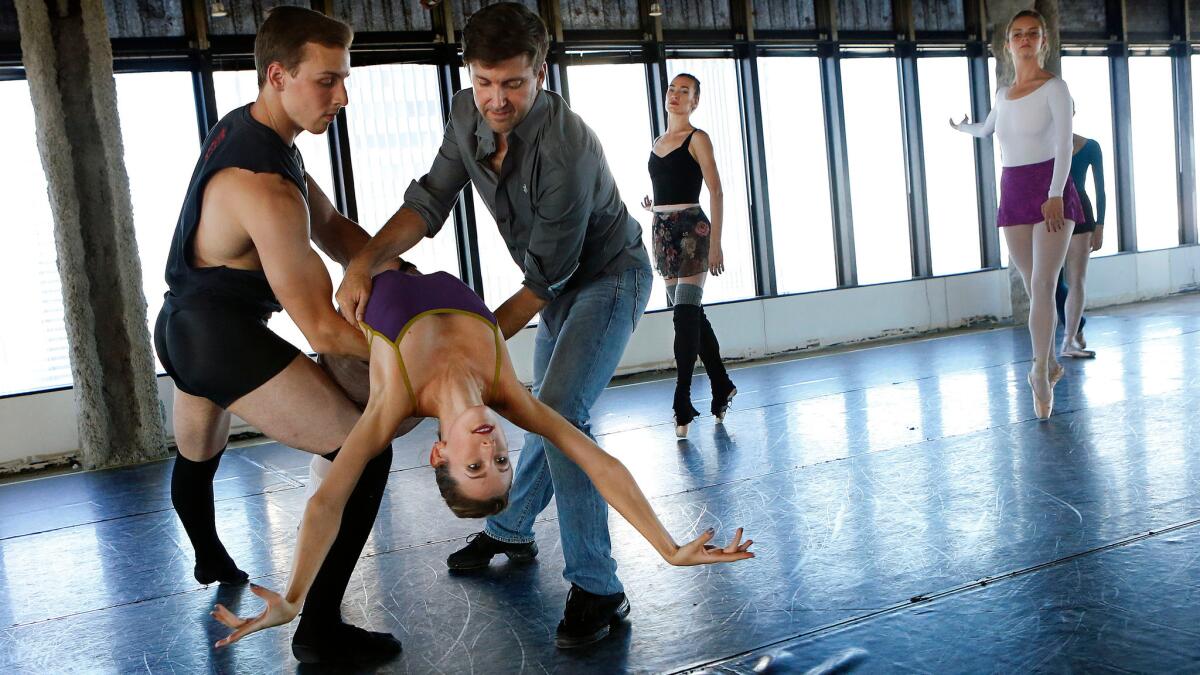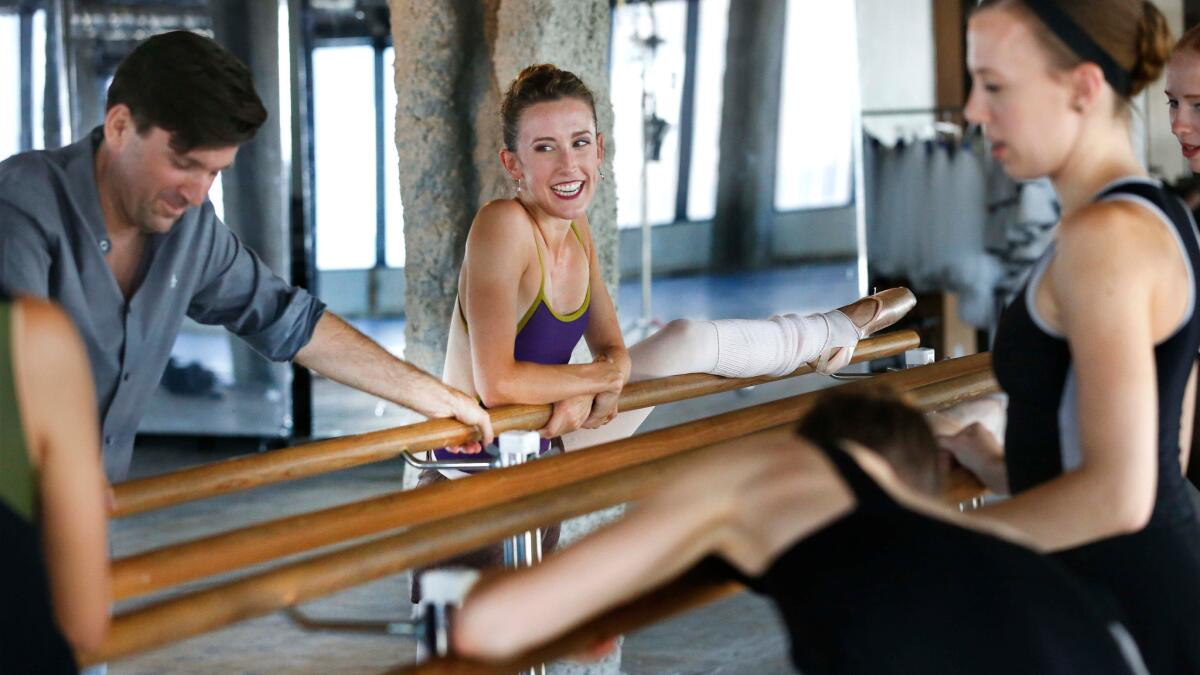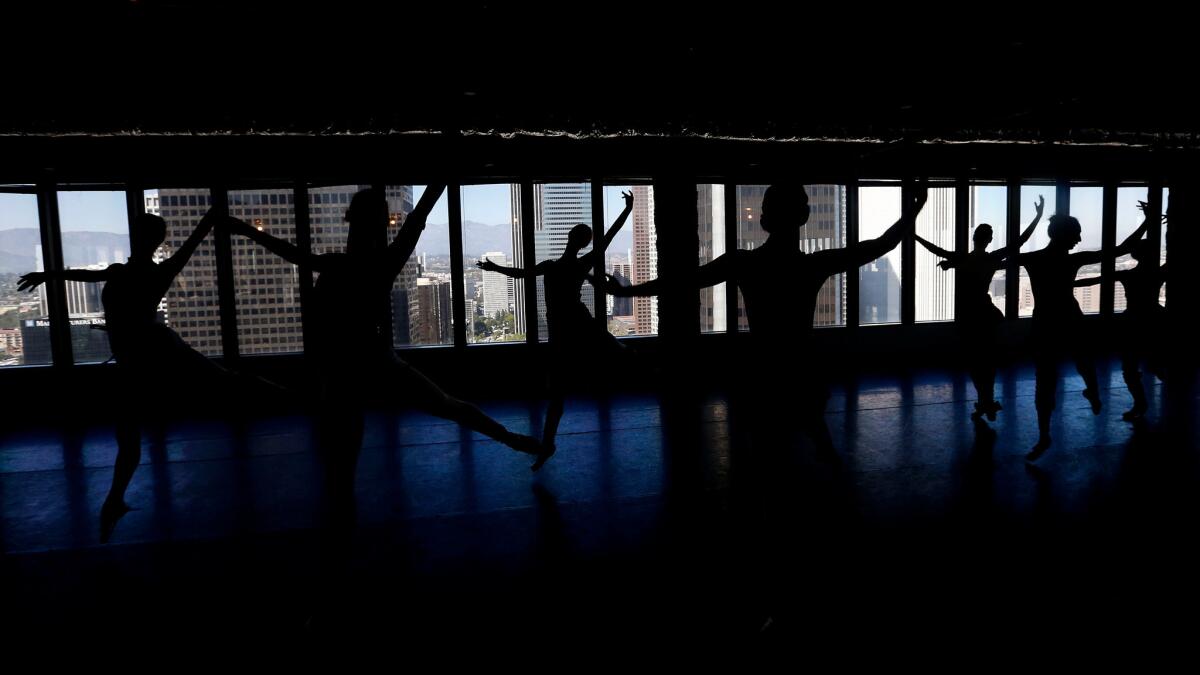How a new dance gets made: Behind the scenes at American Contemporary Ballet
Emily Parker stood still on pointe. Arms spread like wings, she fixed her gaze somewhere in the distance. Dancers spun around her like ribbons in a breeze. A bend, a twist, a slide of foot, a flutter of light. On and on, with no music, only the tap, tap, tap of toe shoes and the sound of texting from those stretching and waiting in the wings.
Parker relaxed her pose. The other dancers flitted toward windows. Choreographer Lincoln Jones walked among them, hand to chin, thinking, and at times twirling alone as if chasing whispers. The afternoon pressed in. He called a break and headed for a laptop. Dancers from American Contemporary Ballet, which on Aug. 11 will perform an original work by Jones, dispersed in the studio heat.
A ballet troupe is a small army of fine lines and grace. Some dancers have been with the company for years, others like Parker are new, finding their places amid mats, bags, tape, calluses, balm, egos, sore backs, battered toes and torn tights. They are led by Jones, a dark-haired man who between smiles and asides moves with quiet intensity. His new production for the company’s “Music + Dance: LA II” series was inspired by 19th century French composer Adolphe Adam and set amid a countryside, a lake and a wedding.
“I don’t know any of the moves yet. It’s all suspense,” Parker, 22, said last month before the first rehearsal for her solo. “Lincoln’s into musicality and phrasing within steps. He’s into speed, but finding stillness within speed. That’s demanding. You’re trying to fire all your muscles but then freezing them in a calm way. You can’t let the audience see what’s underneath.”

Since late June, Jones has been working through allegros and port de bras, breaking down music and finding the right dancer for each part. It’s like tinkering inside a watch or designing a garden. Jones’ company rehearses in a studio of rough concrete and exposed pipes on the 32nd floor of a downtown high-rise. The city falls quietly away as grand jetés and cabrioles flash across a striking view that tapers from the San Gabriels to the Pacific.
“That’s still way too safe,” Jones told one dancer.
“It can’t keep moving like sentences without periods,” he said to three others.
“It’s like tilting water off your head,” he intoned to another.
“The dancers have to fit each piece,” said Jones, 41, who has a boy’s earnestness and a technician’s need for the razor sharp. “Some jump well. Others have great stage presence, perfect shoulders and head movements. I have to play to strengths and limitations.” At a warm-up, Jones, who wore jeans and a plaid shirt, told the company: “What we don’t want is a 1980s Russian style, a bunch of pirouettes in your face.”
During one early rehearsal, Jones spoke of George Balanchine and Fred Astaire while Parker, her frame narrow and taut, stretched at a barre near an upright piano. “She has a vital energy throughout her body. A boldness and a hunger,” Jones said. “She has a gorgeous way of being carried through the air. It almost looks like she’s flying.”
Parker and Jones each faced expectations as opening night drew closer; he to live up to early promise and create a bold bit of magic, she to dance her “first full-blown principal role,” a moment she’s worked for since she was 4, the result of countless hours of rehearsals, Pilates, sprained ankles, iron tablets, replenished electrolytes, stationary bikes and standing in front of mirrors and letting her arms flow from shoulders to fingertips like unbroken ripples through water.
“This is only my second season dancing for Lincoln,” said Parker, who also dances for the Oregon Ballet Theatre. “He brought me on last year when another dancer got injured.”

Parker was fierce and demanding in rehearsals. Her hair in a tight bun, her face impervious, every movement an arc. But when she left the mat on a break, her feet splayed and her shoulders slouched like a flyweight boxer at ease in the shadows. Others in the company struck similar stances, slipping from elegance to nonchalant swagger. It allowed muscles to relax. When Parker returned to the mat, the lines she cut tightened as if a math equation had suddenly turned into a Degas. Her chin pierced the air; her eyes hardened.
“I missed it,” she said.
“It’s OK, we’ll work on it,” said Jones.
“I’m struggling, because I know I need to come back down,” she said.
“The first one doesn’t have to be quite so much,” he said.
Parker half spun, toe to ground, a turn. She lifted into the air, but as she landed, her momentum tugged her forward and nudged her off step. Jones watched. Stayed silent.
“Ergh,” she said. “I’m doing the timing wrong.”
She bit her lip. Took a breath. Checked herself in the mirror. She did the move again. She kept doing it, and then she hit it, bringing to life what was in Jones’ mind, an inner force, neither embellished nor static, driving a young woman toward her fate.
“Yes,” he said.
She did it again to make sure. Once more. A quick breath. A smile. The room relaxed.
“The most important thing to me is that the audience is entertained, that we’re showing them something they haven’t seen before,” said Jones. “It has to work as an organic whole to allow the dancer to come through. It’s kind of like seeing somebody laugh. You glimpse that unrestrained, deeper part of their soul. I want to show them Emily, show them Cleo [Magill], show them all the dancers.”

A child of Fullerton, Jones, who sang in a chorus and saw his first ballet, “La Bayadère,” when he was in high school, started dancing at 19. He received scholarships to the Joffrey Ballet and other dance schools. He danced for the Columbia City Ballet in South Carolina and the Metropolitan Opera Ballet in New York. He quickly decided on choreography: “I always listened to music and imagined dance and movement in my head.”
He and dancer Theresa Farrell, who shared Jones’ love of Balanchine, founded the American Contemporary Ballet in New York in 2004. “The company lasted less than a season,” said Jones. “Theresa and I were very enthusiastic but knew nothing of how to build the kind of infrastructure required to sustain a ballet company.” They resurrected the troupe and moved it to Los Angeles in 2011, partnering with the Da Camera Society and various music directors to provide live chamber music for the company’s performances.
Jones, who often has a book at his side, has been researching the roots, styles and music of ballet. “To be original, you have to understand the historic,” he said. “I’ve spent the last five years learning everything I could about choreography. Balanchine is my biggest influence, but now I’m going backward to the classical stuff.”
Farrell sat beyond him off the mat, stretching her muscles near an open bag, which like the workout bags of other dancers looked as if it had been tossed about in a storm. “Lincoln’s not scared to throw moves out. He’s always re-working it,” Farrell said. “He has this pure vision, and he’s super intense. This is his entire life and being.”
She wiped a line of sweat away. “But you know,” she said, “I’ve never heard Lincoln yell in the studio.”
The upcoming performance of “Music + Dance: LA II” is an homage to the music and romantic ballets popular in Paris in the 1800s when Adam wrote music for such classics as “Giselle” and “Le Corsaire.” Each dancer in the troupe, like a member of a family, will bring something intrinsic: Parker, energy and drama; Magill, stage presence and joy; Farrell, rhythm and attack; Eva Burton, classical refinement; and Jennifer Christie, the soaring hang time of Michael Jordan.

Those strengths, and a few frailties, played out in the studio on a recent afternoon. Parker, sore from holding poses a day earlier for a photo shoot, glided to the center of the mat and rose on pointe. Statue still. Other dancers whirled at the edges. The music began: strings, an oboe, a burst of violins, a slow organ, as if one had wandered into a country church.
“Bells are celebrating, but there’s a kind of dark feeling like I’m being forced into a marriage,” Parker would later say of her interpretation of the part (a bride) she was dancing. Jones concentrates on movement and technique, allowing his dancers to fill in story lines. “I want to escape, but I’m going through tradition. There’s a sadness in me. The role is very dramatic. I’m working more on the dramatic aspect than the technical aspect. The movements are now in muscle memory.”
Jones watched, clicked his fingers.
“5,6,7, 8.”
“Charlotte, you gotta be there by 5.”
Dancers circled Parker, lifting her arms as if unfolding wings.
The music stopped. Jones called a break. All but Parker left the mat. He walked toward her. Spoke softly. He danced beside her. He had been editing the piece in his head for days. Cleaner lines. More expression. It was all on him, to fit his vision to her body. He slid to the side.
Parker took a breath. Alone. She twirled and found air. She landed and her toe shoes tapped like the sound of footsteps across a roof. She stopped and began again. And again.
------------
‘Music + Dance: LA II’
Where: 700 S. Flower St., Suite 3200
When: Aug. 11-14
Tickets: $40-$70
Info: (800) 838-3006, www.acbdances.com
More to Read
The biggest entertainment stories
Get our big stories about Hollywood, film, television, music, arts, culture and more right in your inbox as soon as they publish.
You may occasionally receive promotional content from the Los Angeles Times.











